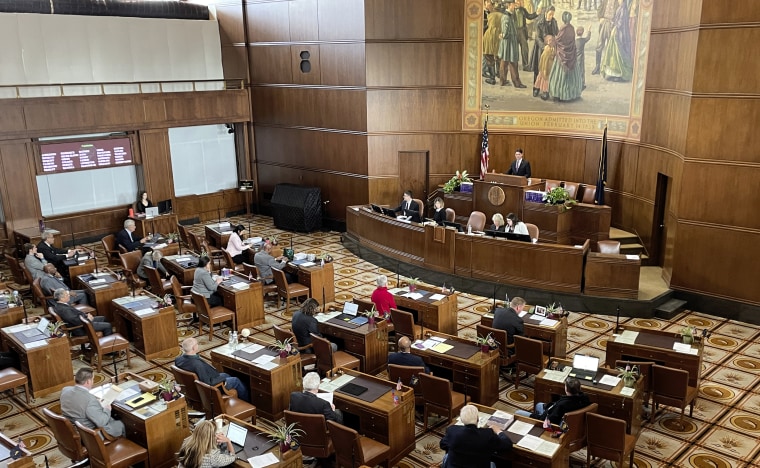Oregon Democrats have advanced a bill that would allow people who are incarcerated in the state to vote.
If enacted, the bill would make the state only the third in the nation to allow people to cast a ballot while in prison or jail. Criminal justice experts estimate that approximately 12,000 people in Oregon would see their voting rights restored.
The bill, SB 579, would allow anyone “in the physical custody of a jail, prison or correctional facility” in Oregon to register to vote, update a voter registration and vote. Under the bill, the person would be allowed to vote in elections using the address and county he or she last resided at before being incarcerated.
Currently, only Maine, Vermont and Washington, D.C. allow people to vote while incarcerated.
As it stands, Oregon is among 22 states in which people lose their right to vote while incarcerated, but where those rights are automatically restored when they are released. In 15 other states, people lose their right to vote while incarcerated but regain it following a specific period of time after the release. In the remaining 11 states, people lose their voting rights indefinitely for some crimes or must complete additional actions and tasks before the right is restored, according to reviews of state laws by the National Conference of State Legislatures and the American Civil Liberties Union.
Supporters have lauded the proposed legislation saying it restores a fundamental civil right.
“Voting is just such an integral component to the way that we’ve built democracy,” Democratic state Sen. Sara Gelser Blouin, one of the bill’s chief sponsors, said in an interview. “People vote when they are in nursing homes, when they are in hospitals, people have the right to vote when they are receiving treatment for drug and alcohol abuse or mental health issues. We don’t condition the right to vote. Once we start making exceptions to that, where do you stop?”
Detractors, however, have criticized it for not featuring exclusions for felons convicted of certain violent crimes.
“Whether it’s murder in the first degree, second degree, criminal negligent homicide, assault in the first and second degree rape, trafficking of persons — all of these categories of felony convicts — we’re pretending that they will be good citizens who will be able to exercise their right to vote,” Republican state Sen. Dennis Linthicum said during a committee hearing this month about the bill. He also expressed concern that prisoners would implement a “new system of corruption within the penitentiary system where you can buy and sell votes” for commissary items like cigarettes.
Other Oregon Republicans have ripped the bill as “extreme” and “egregious” because it would allow “murderers and rapists to vote.”
Supporters like Gelser Blouin, however, point to research showing that formerly incarcerated people who are more easily able to maintain family and community relationships and reintegrate into society see far lower recidivism rates.
“I don’t think that lack of voting is a deterrent to crime. I think that [voting] keeps people engaged in the community and helps people have more of a stake in the community moving forward,” she said. “I don’t see a nexus between your ballot and your prison sentence.”
Democrats enjoy a supermajority in both legislative chambers in Oregon and hold control of the governorship, suggesting that the bill is likely to pass during the current session. The bill sailed through one committee earlier this month and lawmakers said it is likely to come up for a full chamber vote in both the state Senate and House during the last week of the session, at the end of June (a part of the session that is saved for measures, such as this one, that feature fiscal provisions).
A spokesperson for Gov. Tina Kotek, a Democrat, declined to answer questions about whether she would sign the bill if it passed in its current form, saying the office doesn't comment on pending legislation.

